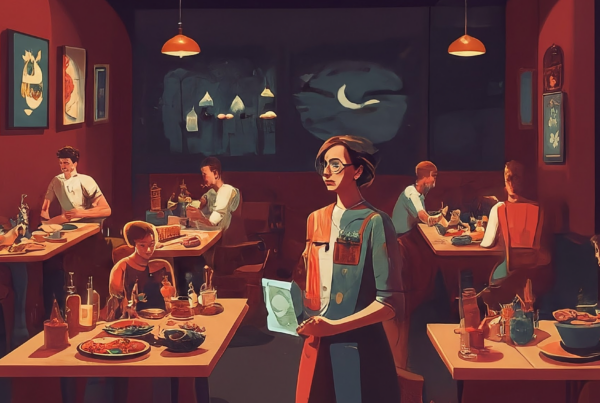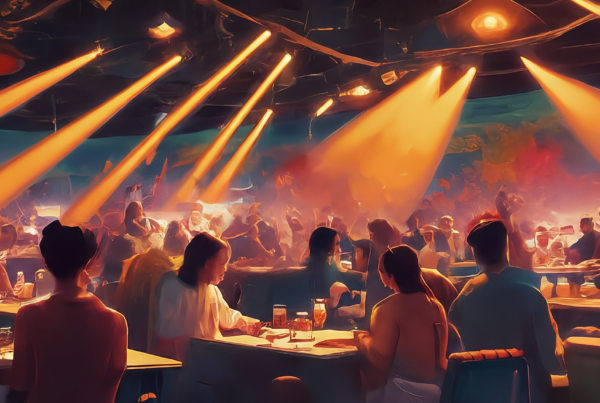In today’s fast-paced world, the hospitality entertainment industry is undergoing a remarkable transformation. As we look ahead to 2025, businesses in this sector are keen to understand the emerging trends that will shape their strategies and enhance customer experiences. With ever-evolving consumer preferences and technological advancements, staying ahead of the curve is more crucial than ever.
For businesses like casinos, restaurants, and bars, understanding these trends in hospitality entertainment is not just about keeping up; it’s about creating unforgettable experiences that resonate with guests. Whether it’s leveraging cutting-edge digital signage solutions or curating personalized entertainment packages, the possibilities are endless. These trends are redefining how businesses engage with their customers, offering new opportunities for growth and innovation.
At DLM Media, we specialize in providing top-tier commercial video programming solutions that cater to the unique needs of multi-location organizations. Our expertise in delivering reliable and high-quality content ensures that businesses can offer an unparalleled entertainment experience. As we delve into the emerging trends in hospitality entertainment, you’ll discover how these innovations can impact your business strategy and elevate your customer engagement to new heights.
Join us as we explore the key trends reshaping the industry, from the rise of on-demand content to the integration of AI-driven personalization. Discover how these developments are not only enhancing the guest experience but also providing businesses with new avenues for revenue generation and customer loyalty. Ready to transform your hospitality entertainment strategy? Let’s dive in!
Technological Advancements Transforming Hospitality Entertainment
In 2025, the hospitality entertainment industry is witnessing a revolution driven by technological advancements. As businesses strive to enhance guest experiences and streamline operations, technologies like artificial intelligence (AI), augmented reality (AR), and over-the-top (OTT) platforms are taking center stage. These innovations are not only reshaping how services are delivered but also elevating customer satisfaction and operational efficiency.
AI is a game-changer in personalizing guest experiences. By analyzing data from various touchpoints, AI systems can tailor recommendations and services to individual preferences, creating a more engaging and customized stay. For instance, AI-driven chatbots can handle guest inquiries, book services, and offer personalized suggestions, ensuring a seamless interaction that enhances the overall guest experience.
Artificial Intelligence: Personalizing Guest Experiences
Artificial intelligence is transforming the hospitality sector by enabling hyper-personalization. Hotels and resorts are leveraging AI to analyze guest data and predict preferences, allowing them to offer tailored recommendations and services. This technology can suggest personalized dining options, entertainment activities, and even room settings, creating a bespoke experience for each guest.
Moreover, AI-powered chatbots and virtual assistants are revolutionizing customer service. These tools provide instant responses to guest inquiries, manage bookings, and offer personalized recommendations. By reducing wait times and enhancing service delivery, AI contributes significantly to guest satisfaction and loyalty.
Augmented Reality: Enhancing Immersive Experiences
Augmented reality is another technological marvel reshaping hospitality entertainment. By overlaying digital information onto the real world, AR creates immersive experiences that captivate guests. Hotels can use AR to offer virtual tours, interactive maps, and engaging storytelling, enhancing the guest experience.
For example, AR can transform a simple hotel room into an interactive space where guests can learn about local attractions or access additional services through their smartphones. This technology not only enriches the guest experience but also provides hotels with innovative ways to engage and entertain their visitors.
OTT Platforms: Revolutionizing Content Delivery
Over-the-top platforms are redefining how content is delivered in the hospitality industry. Unlike traditional cable services, OTT platforms offer a wide range of on-demand content tailored to individual preferences. Guests can access their favorite shows, movies, and even local content through hotel-specific streaming services.
By implementing OTT platforms, hotels can provide guests with a personalized entertainment experience. This not only enhances guest satisfaction but also opens new revenue streams through premium content offerings and targeted advertising. The integration of OTT platforms with in-room technology further streamlines the guest experience, making it more convenient and enjoyable.
Incorporating these technological advancements allows hospitality businesses to stay ahead in a competitive market. By embracing AI, AR, and OTT platforms, they can offer unique, personalized experiences that resonate with guests, ultimately driving customer loyalty and business growth.
Sustainability and Green Practices in Hospitality Entertainment
The hospitality entertainment industry is increasingly embracing sustainability as a core component of its operations. In 2025, eco-friendly practices are not just a trend but a necessity for businesses aiming to appeal to environmentally conscious consumers. These practices not only help reduce the carbon footprint but also enhance brand reputation and customer loyalty.
Many hotels and resorts are leading the way by implementing green practices such as energy-efficient lighting, water conservation systems, and waste reduction programs. These initiatives are often accompanied by green certifications, which serve as a testament to their commitment to sustainability. For instance, the Green Key certification is a prestigious eco-label awarded to hotels that adhere to strict environmental standards.
Eco-Friendly Practices in Action
Several hospitality businesses have successfully integrated eco-friendly practices into their operations. For example, the Hilton Hotel chain has committed to cutting its environmental footprint in half by 2030. They have implemented energy-saving technologies and sustainable sourcing policies across their properties.
Similarly, the Marriott International has launched the Serve 360 initiative, focusing on reducing water and energy consumption and increasing the use of renewable energy sources. These efforts not only contribute to environmental conservation but also result in significant cost savings.
Impact on Brand Reputation
Adopting sustainable practices has a profound impact on a brand’s reputation. Consumers today are more likely to support businesses that prioritize environmental responsibility. According to a Nielsen report, 66% of global consumers are willing to pay more for sustainable products and services.
By showcasing their commitment to sustainability, hospitality businesses can differentiate themselves in a competitive market. This not only attracts environmentally conscious guests but also fosters a sense of trust and loyalty among existing customers.
Benefits for Businesses and Guests
Implementing sustainable practices offers numerous benefits for both businesses and guests. For businesses, it means reduced operational costs, enhanced brand image, and compliance with environmental regulations. For guests, it provides a healthier and more enjoyable stay, knowing that their choice of accommodation supports environmental conservation.
- Cost Savings: Energy-efficient systems and waste reduction strategies lead to lower utility bills.
- Enhanced Guest Experience: Eco-friendly amenities and practices contribute to a more pleasant and guilt-free stay.
- Regulatory Compliance: Staying ahead of environmental regulations ensures smooth operations and avoids potential fines.
As the hospitality entertainment industry continues to evolve, sustainability will remain a key focus. Businesses that embrace green practices will not only contribute to a healthier planet but also secure their place as leaders in the industry.
Personalization and Customization in Hospitality Entertainment
In the ever-evolving landscape of hospitality entertainment, personalization and customization have emerged as pivotal trends shaping guest experiences in 2025. As businesses strive to meet the unique preferences of their clientele, the ability to tailor services and content has become a cornerstone of success. This focus on personalization not only enhances guest satisfaction but also fosters loyalty, creating lasting relationships between businesses and their patrons.
Personalization in hospitality entertainment involves crafting experiences that resonate with individual guests. By leveraging data analytics, businesses can gain insights into guest preferences, enabling them to offer tailored recommendations and services. This approach not only meets the expectations of today’s tech-savvy consumers but also sets a new standard for guest engagement.
Examples of Personalized Services in the Industry
Many businesses in the hospitality sector are already reaping the benefits of personalization. For instance, hotels are utilizing AI-driven systems to analyze guest data, allowing them to customize room settings, suggest dining options, and recommend local attractions. This level of customization ensures that each guest feels valued and understood, enhancing their overall experience.
Restaurants and bars are also embracing this trend by offering personalized menus and drink options based on customer preferences. By analyzing past orders and feedback, these establishments can craft unique culinary experiences that cater to individual tastes, setting themselves apart in a competitive market.
The Role of Data Analytics in Customization
Data analytics plays a crucial role in the customization of hospitality entertainment. By collecting and analyzing data from various touchpoints, businesses can gain a deeper understanding of their guests’ preferences and behaviors. This information allows them to tailor their offerings, from entertainment options to room amenities, ensuring a more personalized experience.
Moreover, data-driven insights enable businesses to anticipate guest needs and preferences, allowing for proactive service delivery. This not only enhances the guest experience but also increases operational efficiency, as businesses can allocate resources more effectively based on predicted demand.
Strategies for Implementing Personalization
- Utilize AI and Machine Learning: Implement AI-driven systems to analyze guest data and provide personalized recommendations.
- Leverage Customer Feedback: Use feedback to refine and enhance personalized offerings continually.
- Integrate with Smart Technology: Employ smart devices to offer seamless, customized experiences in-room and throughout the property.
- Offer Tailored Loyalty Programs: Design loyalty programs that reward guests based on their preferences and behaviors.
By adopting these strategies, businesses can enhance guest satisfaction and foster loyalty, ultimately driving growth and success in the competitive hospitality entertainment industry. As personalization continues to evolve, staying ahead of the curve will be essential for businesses aiming to deliver exceptional guest experiences.
Embracing the Future of Hospitality Entertainment
As we look toward 2025, the Trends in Hospitality Entertainment are poised to redefine how businesses in this sector engage with their guests. From leveraging cutting-edge technologies like AI and AR to embracing sustainability and personalization, these trends offer exciting opportunities for innovation and growth. By staying abreast of these emerging developments, businesses can create tailored experiences that not only meet but exceed guest expectations.
Technological advancements are at the forefront of this transformation. AI is enabling hyper-personalized guest experiences, while AR is enhancing immersion and engagement. Meanwhile, OTT platforms are revolutionizing content delivery, providing guests with personalized, on-demand entertainment options. These innovations are not just enhancing the guest experience but are also creating new revenue streams and operational efficiencies.
Sustainability remains a crucial focus. With consumers increasingly prioritizing eco-friendly practices, businesses that adopt green initiatives not only improve their environmental impact but also enhance their brand reputation and customer loyalty. From energy-efficient systems to waste reduction programs, these practices are becoming essential components of successful hospitality strategies.
- Adopt AI and AR: Leverage these technologies to offer personalized and immersive guest experiences.
- Implement OTT Platforms: Provide on-demand, personalized entertainment to enhance guest satisfaction.
- Embrace Sustainability: Integrate eco-friendly practices to appeal to environmentally conscious consumers.
As these trends continue to evolve, staying informed and adaptable is key. Businesses are encouraged to explore new entertainment solutions and continuously innovate to maintain a competitive edge. By doing so, they can ensure they are not only meeting the current demands of their guests but also preparing for future shifts in the industry landscape. For more insights and solutions tailored to your needs, visit DLM Media and discover how we can help transform your hospitality entertainment strategy.





